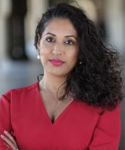 ACR CONVERGENCE 2021—The field of medicine requires an internal cultural shift to be ready for the next pandemic and address challenges that started before the COVID-19 pandemic, such as provider burnout, noted Seema Yasmin, MD, clinical assistant professor of medicine in primary care and population health at Stanford University, California
ACR CONVERGENCE 2021—The field of medicine requires an internal cultural shift to be ready for the next pandemic and address challenges that started before the COVID-19 pandemic, such as provider burnout, noted Seema Yasmin, MD, clinical assistant professor of medicine in primary care and population health at Stanford University, California
Dr. Yasmin presented the ACR Convergence 2021 keynote on Friday, Nov. 5, sharing her thoughts and comments in a discussion-based format with ACR President David Karp, MD, chief of the Division of Rheumatic Diseases at UT Southwestern Medical Center, Dallas.
Originally from London and born to parents from South Asia, Dr. Yasmin studied to be a physician in the U.K. and came to the U.S. to specialize in disease outbreaks with the U.S. Centers for Disease Control and Prevention (CDC). Dr. Yasmin’s time at the CDC colored her perspective on health outbreaks and public health communications.
“No matter where I was sent, there were rumors and so much disinformation and misinformation. Yet in public health, we were so focused on a pathogen and not [these other things],” she said.
This experience led her to study journalism at the University of Toronto and focus on medical myths and the spread of misinformation related to health issues. Dr. Yasmin has since worked as a reporter for the Dallas Morning News, winning an Emmy Award for her reporting. She has also served as a medical analyst for CNN.
Provider Burnout & Challenges
Returning to pre-pandemic normal may not be the right goal, Dr. Yasmin said. Medical professionals and the world will still face a climate crisis, supply chain issues and health provider burnout, issues that predate the pandemic.
“When we do exit the pandemic, if we sigh a massive sigh of relief and go back to business as usual, we will have failed,” Dr. Yasmin said. “I want us to create a new normal that is more resilient and less vulnerable.”
Dr. Yasmin commented on the mental health struggles providers face now, including suicide and other mental health issues. Changing this problem requires a shift in how medical professionals think about healthcare provider wellness.
“We need a culture change. It’s a difficult thing to do, but it’s critical,” she said.
Vaccine Hesitancy
The pandemic has also shed light on the lack of scientific literacy in the general public, Dr. Yasmin said. For example, she cited advice from Anthony Fauci, MD, chief medical advisor to the U.S. president and director of the U.S. National Institute of Allergy & Infectious Disease, early in the COVID-19 pandemic that masks were not needed, but then shortly thereafter said masks were important. He followed the science. The evidence about mask use changed, so he changed his position.
“To a scientist, that was good medicine, but to the public, it was read as flip-flopping,” Dr. Yasmin said.
This thinking also ties into vaccine hesitancy, which is not a one-size-fits-all issue. Many different reasons exist for why people may shy away from the COVID-19 vaccines, she explained. Examples: One person may get all of their other necessary vaccines and feel skeptical of the COVID-19 vaccines because they were developed so rapidly. Someone else may be vaccine hesitant in general, while still others may see vaccines as anti-freedom and anti-American.
Not having experienced a pandemic or not witnessing first- or second-hand the ravages of certain diseases, such as polio, whooping cough or measles, may also lead some people to place less importance on vaccines to fight against diseases, both Dr. Yasmin and Dr. Karp said.
Dr. Yasmin recommends finding out why someone is vaccine hesitant. One area to address more often is why someone is vaccine hesitant beyond just the ingredients in the vaccine itself. Often, cultural factors and misinformation or disinformation are involved. Addressing vaccine hesitancy will likely take more than one conversation with someone, she noted.
Showing empathy—not dismissiveness—for a patient’s experience also can go a long way toward building a relationship with them, Dr. Yasmin added. This approach may make them less likely to go to a website or other venue peddling so-called cures for health problems, which may come up when treating patients with long COVID-19, for example.
Dr. Yasmin recommends finding out why someone is vaccine hesitant. … Often, cultural factors & misinformation or disinformation are involved.
Fighting Vulnerability
Dr. Yasmin also addressed the world’s vulnerability to another pandemic. One reason the COVID-19 pandemic occurred was because different industries remained in siloes vs. collaborating, she said. To become less susceptible to pandemics and public health crises in the future, leaders in medicine will need to come together with other industries to work together and plan together.
“We need to recognize that we live in a world that is susceptible to public health crises,” she said.
Addressing supply chain issues is also part of this better preparation so that providers and their patients are not caught off-guard by medicine shortages like those that took place during the COVID-19 pandemic, including shortages of hydroxychloroquine and tofacitinib, Dr. Karp said.
ACR’s Progression
Dr. Karp updated attendees on the ACR’s progress over the past year, noting that the College has continued to grow despite pandemic challenges. “Life for the ACR has been pretty normal. Many activities have not slowed or stopped,” he said.
Dr. Karp shared information on the progress of the COVID-19 Global Rheumatology Alliance (GRA), a section of the ACR formed in the early days of the pandemic by rheumatologists from around the world who wanted to start a registry of the effects of COVID-19 on patients with autoimmune disease. To date, the GRA has collected data on more than 20,000 individuals with rheumatic disease and COVID-19. The GRA is also collecting information on patients’ experience with vaccinations and has published more than 30 manuscripts.
Other initiatives that have flourished over the past year include the Rheumatology Research Foundation, the Virtual Rheumatology Learning Collaborative (ViRL) and similar efforts geared toward fellows, and Collaborative Initiatives (COIN), which aims to educate patients about complex diseases and eliminate disparities. “I think [COIN] is one of the hidden gems of the ACR,” Dr. Karp said.
Although fairly early on ACR leaders decided to have ACR Convergence 2021 be a virtual meeting—before the Delta variant overtook the U.S. this summer—Dr. Karp remains optimistic about meeting in person in Philadelphia next fall.
Vanessa Caceres is a medical writer in Bradenton, Fla.




